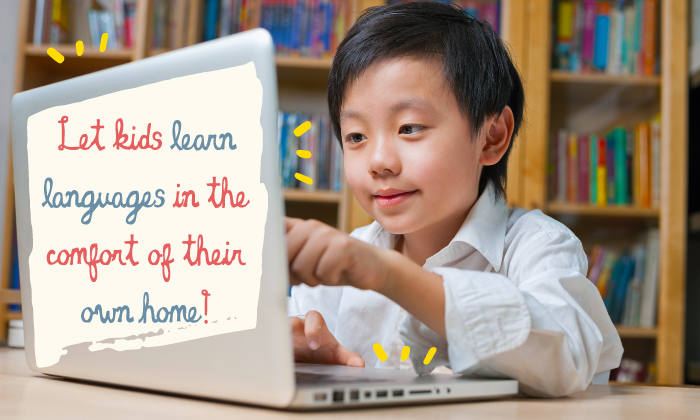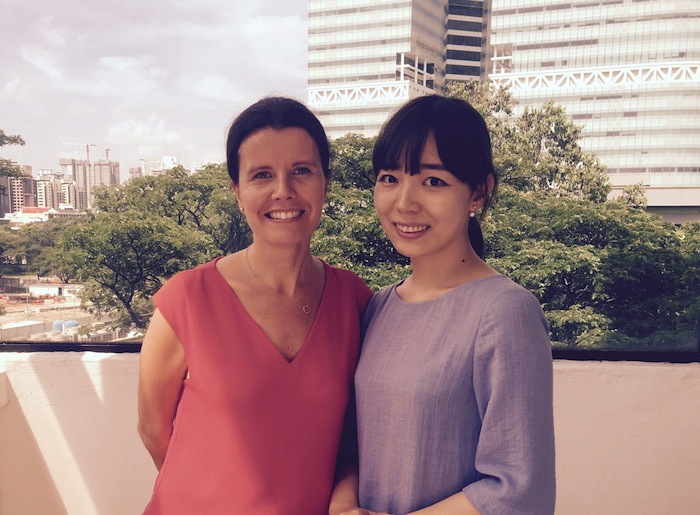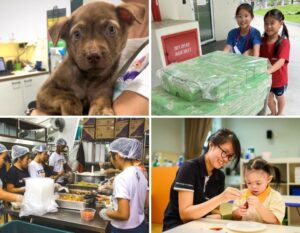
Eager for your kiddos to learn another language but less than thrilled about schlepping them to lessons? Check out VivaLing, the world’s first online language academy for kids!
Given how diverse and multicultural Singapore is, it’s no surprise that a majority of people speak more than one language. If you’re keen for your kiddo to jump on the bilingual (or trilingual) train, be sure to check out VivaLing, the world’s first online language academy (which just so happens to be based in Singapore). It’s particularly convenient for mamas who are carless, or who just don’t love the idea of dragging their kiddos all over the island for endless classes. What sets VivaLing apart is that it’s all conducted from the comfort of your own home on a computer or tablet screen, allowing little ones as young as 3 to receive personalised, 1-on-1 attention from native speakers with strong teaching backgrounds who know how to keep little ones enthused and engaged! We sat down with Zihan Wang and Ludivine Hamy of VivaLing’s leadership team to find out a bit more about their revolutionary approach…

What brought about the idea for VivaLing? Especially since you’re the world’s first online language academy for kids.
In a world where the knowledge of foreign languages has a significant impact on people’s personal and professional lives, 2 billion children aged 1 to 15 and their families are still in need of an effective and convenient way to learn. This is why Bernard and I [Zihan] decided to create VivaLing!
We wanted VivaLing to be a real language academy using science and technology to ensure that young learners enjoy the most fruitful experience through hyper-personalised coaching. As an academy, we train our coaches so that each benefits from the cumulative experience of all, and from the latest findings in language-learning sciences. We also advise families on language-learning strategies and keep them posted on day-to-day progress. In this sense, VivaLing differs significantly from other, more traditional tuition schools.
Do kids learn language differently than adults? How?
Adults learn in an explicit manner. They are given, or made to understand, or deduct a language rule, and they apply it. Young children learn in an implicit manner. Their brain is a formidable statistical processor. Based on the language input they get, they make assumptions on the language and form a model. The model is continuously adjusted with further input and feedback. The processing needs a lot of high quality language input to be effective. It is enhanced by well-known language acquisition drivers such as engagement and social interaction.
How young can you start working with children to learn language?
There is no minimum age to start learning a language: children born into bilingual families start learning from birth! However, at Vivaling, we start enrolling children from the age of 3 onwards. We have adapted the length of our lessons to maximise the learning experience within their short attention span; this is why we propose 15-minute lessons for the younger ones. Two or three 15-minute lessons per week are much more efficient than a 1-hour lesson for children under 6.
Can you tell us a bit more your pedagogical approach?
We teach using the VivaLing Language Learning Approach (ViLLA). It is an advanced version of PCA (Principled Communicative Approach) and CLT (Communicative Language Teaching) catering specifically to kids, online. It is based on the fact that communication (oral and written) is both the objective of a language and a means to learn it. But communication alone is not enough; the ViLLa pedagogy provides for controlled and structured learning. It activates language learning by using content that is personalised, relevant and highly engaging for the child. Our approach is therefore ideal for children to experience the joy of learning, while also achieving the Ministry of Education’s desired outcomes.
How do you keep kids engaged and paying attention when they’re sitting at a screen?
Our coaches are experienced and trained in teaching children: they are fun, engaging and they know each child’s hobbies, passions, and character. We also provide them with a wide range of interactive tools to make each lesson unique and captivating. Each coach can use games, contests, videos, e-books, cartoons, songs and flashcards to hold their attention and keep them motivated.
Is there any homework?
Every session is recorded and posted on the parent’s account. Each of our students can watch it again (and again!) and it becomes like a second or third session. Depending on each child’s objectives, age and motivation, we can suggest some homework. We are also always happy to share some new games, readings and videos to maximise every child’s language exposure.
What are the qualifications of your teachers? Do they specialise in early childhood education?
We prefer to use the term ‘coach’ rather than teacher because our approach focuses on guiding your child during their learning journey, rather than simply standing in front of them and ‘teaching’. Our coaches are all native speakers and they all have a strong background in school teaching. They really know how to teach young children and how to keep children interested and engaged, even the more fidgety ones! Some of them are also trained for special-needs kids with dyslexia and other learning difficulties.
All our coaches speak English regardless of the language they teach, which is important to ensure a good parent-teacher relationship. Last but not least, we provide our coaches with regular training and professional development in order to make sure they provide the best teaching. All of this makes of VivaLing a real language academy, not just a “marketplace” where children and teachers meet without any guarantee of success!

Are parents encouraged to be present during the lessons?
We recommend that one parent attend the first session to help the child feel comfortable and confident. However, experience has shown that children above the age of 6 are completely autonomous and want to be left alone after their first session. And with our brand new VivaLing app, any child can connect with his coach in the blink of an eye!
Thanks ladies! To find out more, mamas, visit VivaLing.com!






 View All
View All





 View All
View All











 View All
View All





